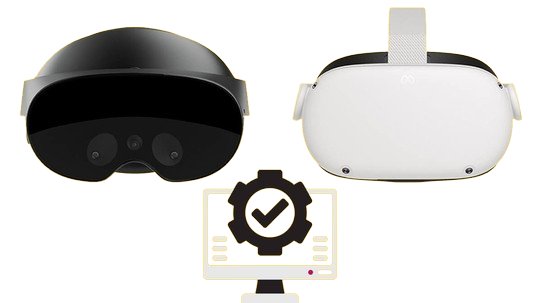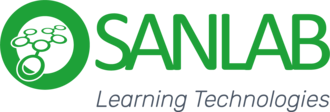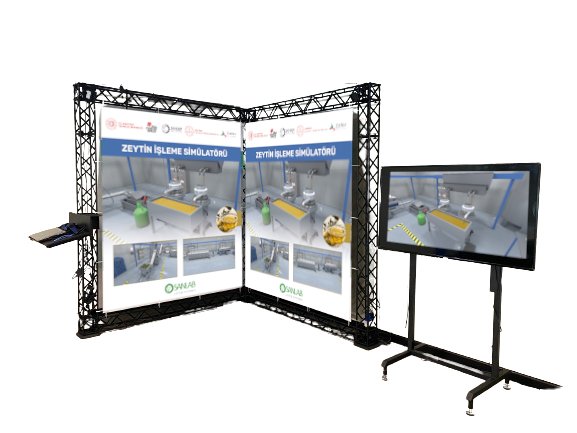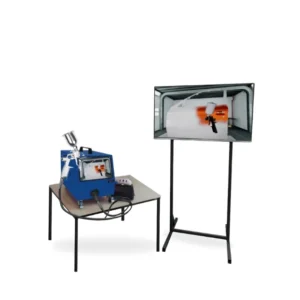OLIVE PROCESS SIMULATOR
SANLAB Learning's olive process simulator allows users to learn olive oil production processes and solve possible problems in a virtual environment. The software, supported by VR and AR technologies, offers theoretical and practical training.
Olive Process Simulator
Revolutionizing Olive Oil Production Training
Olive process simulator by SANLAB Learning is an advanced tool. It offers a realistic and immersive training experience for the olive oil industry. This simulator covers all aspects of olive processing, from harvesting to oil extraction. It ensures trainees can operate modern olive oil production facilities. Simulator replicates real-world conditions. It helps users master olive oil production in a safe, controlled environment.
It teaches the structure, components, and workings of olive oil production. It covers both theory and practice. The software teaches health and safety processes for olive oil production. It ensures a safe working environment. The simulator uses VR and AR to make olive oil training more engaging. VR and AR let users closely examine olive oil production.
Why should people use Olive Process Simulator Training?
Olive oil production is a complex process requiring precision, knowledge, and skill. Every step, from handling olive fruits to extracting high-quality oil, must be perfect. It is vital to maintain product quality. Olive process simulator lets trainees learn and perfect their skills. It avoids the risks of using real equipment and produce.
Here are the key reasons to choose the olive process simulator:
Comprehensive Training for All Stages of Olive Processing:
The simulator covers every stage of olive oil production. It includes harvesting, washing, crushing, kneading, centrifugation, and filtration. Users learn to handle olives carefully. This prevents damage, ensures proper cleaning, and maximizes oil extraction. It also maintains the highest quality standards.
Realistic Virtual Environment:
Trainees work in a virtual olive processing facility. It has realistic machinery and equipment. This immersive environment lets users learn the olive oil production. They can explore the layout, equipment, and workflow.
Cost-Efficient Training:
Olive oil production training can be costly. Equipment, raw materials (olives), and mistakes that waste products drive up the costs. The olive process simulator eliminates these costs. It offers virtual training, needing no physical resources.
Olive Process Simulator's Comprehensive Training Scenarios
The olive process simulator has many training scenarios. Each focuses on a different aspect of olive oil production. These scenarios simulate real-world challenges. They guide trainees through tasks. This builds their confidence and skills.
• Olive Quality Assessment
Trainees learn to assess olive quality before the production line. The olives' condition is critical to the oil's quality. Trainees must identify and remove damaged or inferior olives during selection.
• Equipment Operation
The simulator gives a detailed guide to machines used in olive oil production. These include crushers, malaxers (kneaders), decanters, and centrifuges. Trainees will learn how to:
Operate and calibrate the machines:
Proper operation and calibration of equipment is vital. They ensure peak performance and high yield.
Troubleshoot common issues:
The simulator helps users fix common equipment issues. It ensures smooth and efficient production.
• Oil Extraction and Processing
This scenario takes trainees through the oil extraction process. It starts with crushing the olives and ends with filtering the final product. Key focus areas include:
Temperature and time control:
Understanding the importance of controlling these variables to ensure high-quality oil extraction.
Yield maximization:
Learning techniques to increase oil yield while maintaining product quality.
• Packaging and Storage
Trainees will learn to package olive oil correctly. The packaging must protect it from light, heat, and air, which degrade its quality over time. It also covers proper storage techniques. They include maintaining ideal temperatures and humidity in the storage area.
Realistic Simulation of Olive Oil Processing
Olive process simulator is a training tool. It closely replicates the conditions and equipment of professional olive oil producers. Trainees can navigate the entire process, from harvesting to packaging.
• Harvesting:
Trainees will learn the best ways to harvest olives. They must not damage the olives. This will ensure only the highest-quality olives are selected for processing.
• Washing and Sorting:
This stage is to clean and sort the olives. Remove dirt, leaves, and damaged olives to prepare for oil extraction.
• Crushing and Kneading:
Trainees will practice using machines that crush olives and knead the paste. It's critical to control the temperature and kneading time. They directly affect the yield and quality of the olive oil.
• Equipment Simulation and Handling
The olive process simulator mimics real-world equipment. It lets trainees practice using the machines in olive oil production. Key features include:
• Adjustable machine settings:
Trainees can adjust the settings on the simulated machines to optimize production. They can change the temperature and speed, for example.
•Maintenance and troubleshooting:
Users will learn to fix common problems and maintain the equipment. This will help avoid production delays.
VR Olive Process Training is Essential for Optimal Learning
Real-Time Feedback and Performance Reports in Olive Process Simulator
Olive process simulator gives real-time feedback on the trainee's performance in each scenario. This feedback helps users to:
• Monitor and improve accuracy:
The system gives instant feedback on tasks like machine operation and oil extraction. It checks if someone completed them with accuracy.
• Track efficiency:
The simulator tracks task completion speed and efficiency. It shows areas that may need improvement.
• Identify mistakes and corrective actions:
Trainees can quickly see their errors and learn to fix them. This helps reduce mistakes in real-world applications.
At the end of each session, trainees receive detailed performance reports that include:
• Task accuracy
• Completion times
• Techniques mastered
These reports offer insights to improve training for olive oil production.
Safety and Risk-Free Learning
Olive oil production facilities use heavy machinery and high temperatures. They also handle large amounts of raw materials. These factors can pose risks if not managed. The olive process simulator eliminates these risks. It provides a virtual space for trainees to practice. They can operate machinery and perform tasks without risking injury or loss.
• Safe learning environment:
Trainees can test different settings and techniques. They need not worry about damaging equipment or making low-quality oil.
• Hands-on experience:
The simulator offers a hands-on way to learn. It lets users build confidence before working in a live production facility.
Green Friendly and Cost-Efficient Training
Traditional olive oil training methods often waste raw materials, energy, and time. This is due to mistakes made during the learning process. Olive process simulator is eco-friendly and cheap. It removes the need for physical olives, energy use, and machine wear.
• Reduced waste:
The simulator removes the waste from failed production runs. It lets trainees practice repeatedly without harming the environment.
• Cost savings:
Simulator uses virtual tools. It cuts training costs, saving materials and energy. It offers endless chances to develop skills.
Preparing Trainees for the Real World
Olive process simulator is an educational tool. It is also a prep platform for real-world production environments. The simulator provides training scenarios and real-time feedback. This ensures trainees can confidently and skillfully join the production line. The simulator will make workers successful in the field. It will work for both small olive oil producers and large, industrial factories.
Conclusion: The Future of Olive Oil Production Training
SANLAB Learning's olive process simulator offers a revolutionary approach to learning the intricate process of olive oil production. With realistic simulation, comprehensive scenarios, and real-time feedback, this simulator provides trainees with the tools they need to excel in olive oil production facilities. From mastering equipment operation to maximizing yield, the Olive Process Simulator prepares trainees for the challenges they will face in real-world production environments. With its eco-friendly, cost-effective, and risk-free training model, the olive process simulator is an invaluable resource for vocational schools, industrial training centers, and corporate training programs. Embrace the future of olive oil production education with olive process simulator.
Virtual Reality Integration
Using virtual reality (VR) in the olive process simulator improves training. It creates a realistic, immersive environment. VR technology allows operators to safely train on real-world olive processing tasks. Trainees can practice in confined spaces. They must adapt to different conditions. They must also handle various stages of the olive processing workflow. The 360-degree visuals and advanced graphics simulate olive processing systems. They help users understand the controls and techniques. Also, VR provides real-time feedback. It helps trainees spot and fix mistakes. This speeds up learning and improves their adaptability to different olive processing tasks.
Equipment Requirements of Olive Process Simulator
• 1 simulation computer
• 1 monitor/TV
• 1 virtual reality glasses
• 1 stand

Quantification and Consideration
Name of the institution providing education
Name of the person providing education
Measurement and quality control
Data from the completed course
Student name
Date the course was given
Total duration of the course
Reports of completed lessons



















